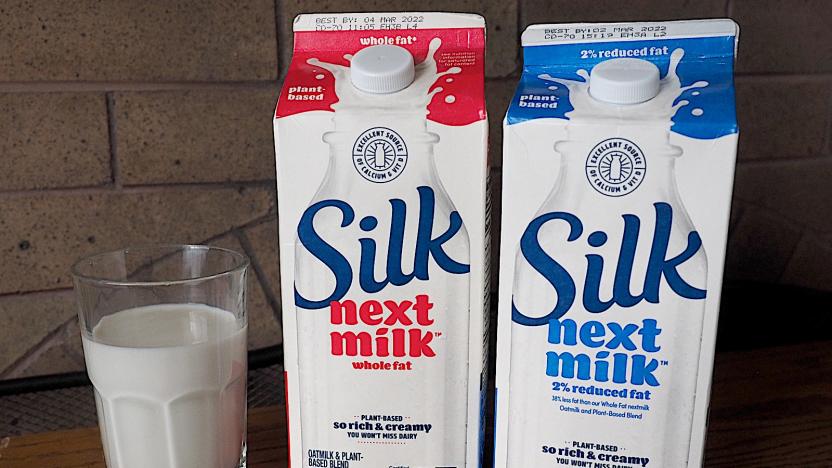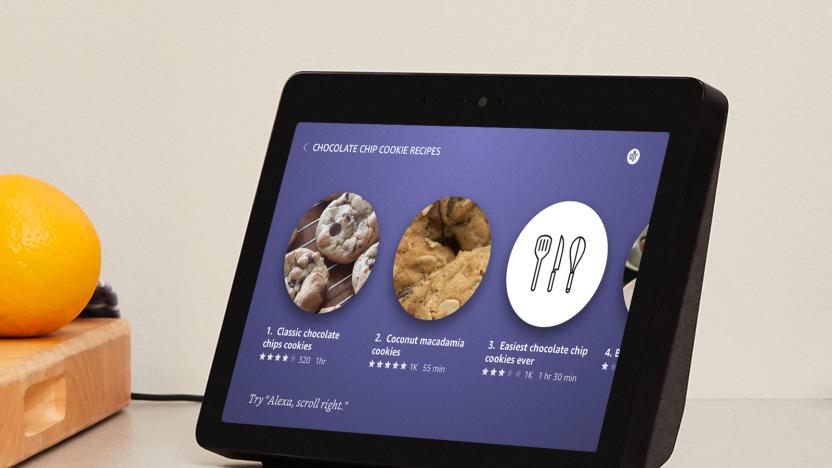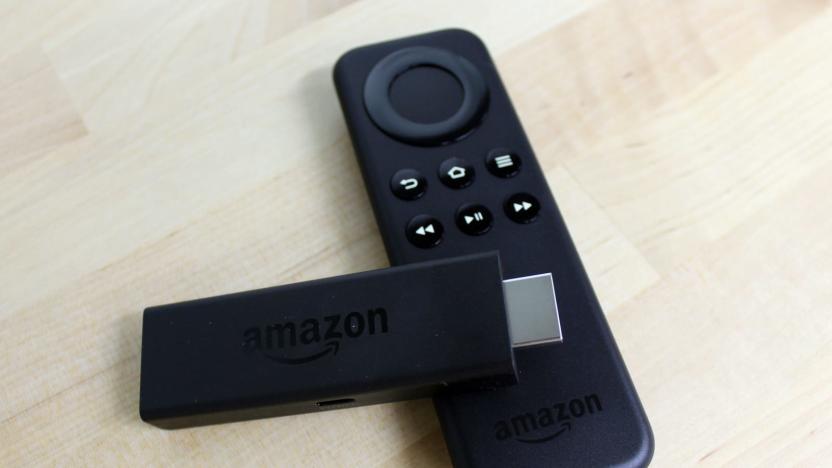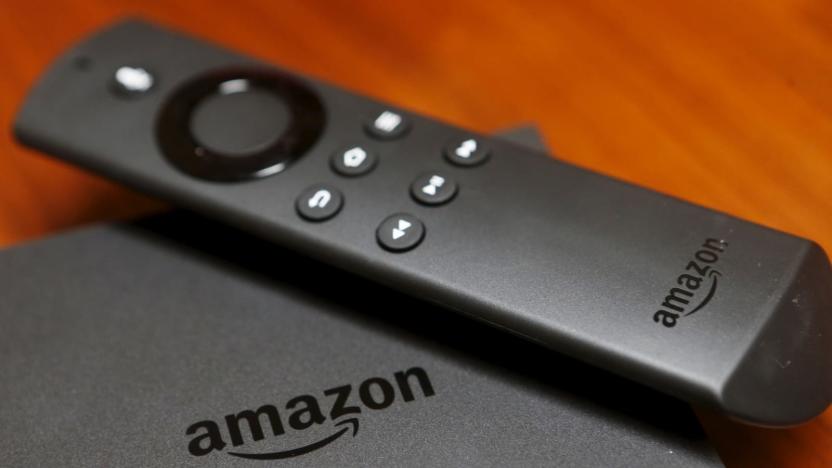silk
Latest

I tried Silk’s dairy-inspired Nextmilk and wasn’t fooled
Silk's Nextmilk is a plant-based milk that's tailor-made so that "you don't miss the dairy."

Amazon's new Echo Show packs a larger display and improved audio
Amazon's seemingly non-stop device announcements now include a revamp of its first smart display. The internet giant has unveiled a second-generation Echo Show that ditches the (frankly boring) look of the original in favor of a minimalist design with a much larger 10-inch display. And there's a good reason for that display -- the Echo Show offers web browsers (both Amazon's own Silk and Firefox) to help you watch YouTube and access other services that aren't built-in. It's also helpful for newly-added Skype video chat support, Vevo music videos and even live TV through new Hulu and NBC integrations as well as a just-introduced Fire TV Recast DVR peripheral.

Amazon’s Fire TV devices add web browsers to access YouTube
Browsing the web on the big screen in your living room isn't something many of us are clamoring for. Still, Amazon already added its own Silk browser to select Fire TV devices last month, but is expanding its availability to all Fire TV gadgets today. It's adding Firefox as a second web browsing option, too. Both browsers are available on every Fire TV device in all countries they are sold in starting today -- just in time too, since the browsers help owners get around Google's YouTube block.

Amazon's Silk web browser is now on Fire TV devices
If you've been looking for a way to browse the web on your Amazon Fire TV, now's the time. The company has just released its Silk Browser for its media gadgets, making it compatible with the first and second generation Fire TVs, the second generation Fire TV Stick and the various smart televisions with Fire TV Edition built in.

Graphene-fed silkworms can spin super threads
Turns out graphene, the wonder material with so many potential applications, is also the secret sauce to making tougher silk. A team of scientists from Tsinghua University in Beijing successfully created silk that's twice as tough simply by feeding the material to silkworms. In order to do so, they coated leaves with a solution that contains either carbon nanotubes or graphene. Carbon nanotubes are essentially rolled up graphene, which is a single layer of tightly packed carbon atoms. The researchers opted for the feeding method, because it's much simpler and more environmentally friendly than treating the final product in chemicals.

Amazon's tablet web browser is getting easier to use
Amazon's Silk may not be the darling of the web browser world, but you should know it's still getting plenty of affection. The internet giant is recapping recent updates that promise an easier-to-use tablet surfing experience. You'll now see your most visited sites as easy-to-read tiles when you visit Silk's home screen, putting your go-to page a quick tap away. Bookmarking a page has been simplified to a single tap, and there's a reading list section on the home screen that offers quick access to your saved articles. Oh, and this is your dream upgrade if you can't help but open sites in new tabs -- you can keep an unlimited number of tabs open instead of the previous 10. All good things to know, especially since it's been nearly a year since we heard any updates on the supercomputer-powered browser project.

Nanotube-soaked spiders spin super-strong silk
Orb spider silk, already among the toughest and strongest materials found in nature, could soon get a super-strong nanoscale upgrade. A research team from the University of Trento, Italy recently sprayed 15 Orb-weaving spiders, members of the Pholcidae family, with carbon nanotube or graphene particle solutions. They found that doing so caused some of the spiders to spin even stronger silk than what they normally do. The team administered five spiders with a graphene-water solution and another 10 with a carbon-water mix. While some spiders subsequently spun sub-par silk (and four of them died outright), a few of the carbon-dosed arachnids actually produced strands 3.5 times stronger than the most resilient natural silk we know about.

Amazon gives Silk browser UI a major overhaul
Amazon made a big deal out of the Silk browser when it launched, but we've heard little about this particular brainchild after that. Now, nearly a year after the Trending Now section was introduced, the company has unleashed its first major update. We're talking about a complete redesign that begins with a mini-tutorial the moment you launch the updated browser. Opening a tab brings its new start page populated with your most visited websites and address bar. The bookmarks and browsing history that used to live here? They've shifted to a menu section in the hidden left panel. Speaking of bookmarks, you can now view them in either list or grid forms; if you decide to fire up a few URLs, the updated tabs' more rounded design could make switching between them easier. A smattering of other interface and under-the-hood changes also come with the new Silk -- the question is: will they be enough to push it past the remaining mobile browser contenders?

Skype promising CD quality sound from new 'Opus' audio codec, fewer choppy calls
Skype's got a new audio codec that it thinks you should be pumped about, and it's called "Opus." It's been kicked around at Skype since March 2009, though work didn't begin in earnest until June of the same year, and it was just certified by the IETF as a standard of online audio. Senior Skype architect Koen Vos lead a team of audio engineers to create the hybrid audio codec, combining Skype's own "SILK" codec with Xiph.Org's "CELT" codec, intending to create a low-bandwidth codec "designed for the internet." But what does that mean for us? It means "CD quality" audio (fullband stereo sound) over Skype, regardless of internet connection. And what about those pesky packet loss issues that cause Skype calls to often sound choppy? "It has multiple mechanics to deal with and recover from packet loss plaguing the network," promises audio/video product engineering director Karlheinz Wurm. So ... uh, less of a chance of sounding like an Autobot then? Great! Wurm says the new codec "will make a quiet but crystal clear entry into the world" without naming exactly when. And yes, Opus is expected to become standard across all Skype platforms. What's that, you want to watch a 45 minute speech about Opus? We've got you covered, just below the break.

Amazon Silk browser on Kindle Fire tracks page visits to generate trends, isn't as spooky as it sounds (update: opt-out exists)
When you pick up that new Kindle Fire HD this fall, one of the first things you'll notice is an updated version of Amazon's Silk web browser with a Trending Now section. It's a clever trick that takes advantage of Silk's server-based caching to find out what sites are popular among owners. That sounds good on the surface, but it doesn't take much effort to realize that there are privacy concerns already in the air -- Amazon is sharing personal web habits with a wider audience, after all. While the section is unlikely to include any identifying information, there's no immediate sign that tablet owners can keep their behavior private, and that could create some indignation among those who'd prefer to surf in isolation. We've asked Amazon if there will be an opt-out escape hatch and will let you know if there's a definitive answer. In the meantime, we wouldn't necessarily worry. Silk shouldn't be caching your e-mail, and it's only likely to ever show pages that have far more traffic than anything you'd be embarrassed to show to others. As far as we can tell, your secret knitting obsession should be safe. Update: A spokesperson has confirmed that the option to disable Silk's caching is still available, and that switching it off will cut you out of Trending Now; that's a very all-or-nothing approach, but it'll likely suit those put off by the browser's predictive approach in the first place. Secure pages are still out of the picture as well, which should keep those private Twitter messages out of the equation.

Google badmouths HTTP behind its back, proposes SPDY as a speedy successor
If there's anything that Google doesn't like, it's things that collect dust. The company is famous for its annual spring cleaning efforts, in which the firm rids itself of redundant and dead-end projects, along with more bullish moves, such as its push to overhaul the internet's DNS system. Now it's looking to replace HTTP with a new protocol known as SPDY, and to that end, it's demonstrating the potential speed gains that one might expect on a mobile network. According to the company's benchmarks, mean page load times on the Galaxy Nexus are 23 percent faster with the new system, and it hypothesizes that further optimizations can be made for 3G and 4G networks. To its credit, Google has already implemented SPDY in Chrome, and the same is true for Firefox and Amazon Silk. Even Microsoft appears to be on-board. As a means to transition, the company proposes an Apache 2.2 module known as mod_spdy, which allows web servers to take advantage of features such as stream multiplexing and header compression. As for HTTP, it's no doubt been a reliable companion, but it seems that it'll need to work a bit harder to earn its keep. Stay weird, Google, the internet wouldn't be the same without you.

How would you change Amazon's Kindle Fire?
The Kindle Fire is less a tablet and more a $200 window into Amazon's storefront. The 7-inch slate that shares its DNA with the BlackBerry PlayBook lacks any physical features bar a micro-USB port, headphone jack and speaker. Internally, that 1GHz CPU is paired up with 512MB of RAM and 8GB storage, with no option for increased size, Bluetooth, 5GHz WiFi or 3G. Performance was fine inside the company's carousel sandbox, but step outside and things became outrageously herky-jerky, especially in the Silk browser, which didn't live up to its name. We found that there was plenty we'd like to change to make it more of a useful tablet, but did we miss the point? You probably had one bought for you in the Holidays and it's had three or four months solid use since then, so what do you think? Is it a good companion on your daily commute, did it justify winning our E-Reader of the year prize and if Jeff Bezos was reading all of your comments in anticipation for version two, what would you demand he changes?

Silk ported from Kindle Fire to rooted Android devices, other web browsers now jealous
Give it time and eventually someone will port your favorite browser to everything, even your toaster, if you're lucky. A group of developers on the XDA-forums has begun sharing how to port the Silk web browser found on the Amazon Kindle Fire to various Android devices. To accomplish this, you'll need a rooted Android device, whereupon you can download a package file and install it to the /system/lib directory with permissions set to the same as the other files in that folder. Users can choose to install any of the .apks that they want to side load, but will need to ensure that they also move the Silk apk from /data/app to /system/app. After a reboot, the Silk browser should be good to go, complete with access to Amazon's cloud-based services through your favorite device. That's just our quaint little summary, though: for the full instructions, you'll most definitely want to hit up the source link.

Kindle Fire stops blocking Android Market site, hijacking your browser
Some of you may have noticed, when perusing the interwebs on your Kindle Fire, that a certain Google-branded Market refused to load in the slate's Silk browser. In fact, it automatically redirected you to the Amazon App store in an unsettling bit of URL hijacking. Well, with the latest update to the tablet, that slightly befuddling restriction has been lifted and the questionable behavior rectified. Presumably this was originally intended to save customers confusion and support staff headaches when trying to install an app from the Android Market failed. But, actually intercepting and redirecting a user isn't becoming of a company that expects us to trust it with our data -- especially our browsing and financial info. Thankfully now, you can visit the Market in all its glory on your Fire, just don't expect to install apps from it any time soon (...at least not without some hacking).

Galaxy Tab gets a taste of Kindle Fire, but things aren't all silky smooth
Did you jump on the bandwagon when the tablet craze hit by getting an original Galaxy Tab, but now you feel a tinge of jealousy seeing the more modern UIs on newer slates? Well, you can rid yourself of that envious feeling by loading the Kindle Fire's software onto that old Tab of yours. Giga OM did the deed, giving us an overview of the process -- it's mainly a matter of extracting the code from Amazon's slate and installing it on Sammy's -- along with its results. Turns out, the Tab doesn't have all of the Fire's functionality, though the basic bookshelf interface (which is akin to an app launcher), video app, books, and magazines are all available along with the Fire's custom Amazon Store. Unfortunately, the Silk browser has yet to be enabled, and the UI still crashes on the regular, but teaching an old dog new tricks isn't easy, okay? Head on down to the Source for the full rundown, and there's even more details at XDA-Developers for those daring enough to do this bit of software switcharoo themselves.

Behind Amazon's Silk browser lurks a really fast supercomputer
We were hardly shocked to see Fujitsu atop the most recent list of the world's fastest supercomputers, but perhaps more surprising is the fact that Amazon cracked the top 50, as well. Turns out, the company's Elastic Compute Cloud (EC2) servers are powered by a Linux-based, 240-teraflop beast that boasts 17,024 cores, 66,000 GB of memory, and a ten gigabit Ethernet interconnect. That's good for 42nd place on Top 500's global rankings, and it's also good enough to power Silk, the browser you'll find on the Kindle Fire. But Amazon has a long way to go before catching up with the Fujitsu K, which recently cracked that vaunted ten petaflop barrier.

Amazon Kindle Fire review
It seems like ages since Amazon introduced us to the $199 Fire at a hectic New York City event, but in truth that was only about six weeks ago. Maybe our perception of time is warped because we've been hearing talk about this 7-inch Android tablet for months now. Maybe it's because Amazon launching a tablet seemed like such a natural thing to do after Barnes & Noble paved the way with its Nook Color. Or, maybe it's just because the gadget Amazon shipped looks nigh-identical to the 7-inch BlackBerry PlayBook that we've had for, well, ages.For whatever the reason, what Amazon has delivered is a device that is intimately familiar yet mysterious -- a simple, minimalistic exterior design hiding a flashy, seemingly quite trick customization that's sitting atop a decidedly ho-hum Android Gingerbread build. Our questions leading up to this review were many: How will it handle sideloading? Are the battery life and performance better than the PlayBook? Can a tablet that costs two hundred bucks stand a chance against those that cost two and three times as much? C'mon baby, click on through to find out.%Gallery-139262%

Amazon Silk browser spins a faster mobile web, courtesy of cloud servers (video)
Part of Amazon's new Kindle Fire pitch is its promise of Amazon Silk -- a "split browser" exclusive to the tablet that gets the heavy lifting done on its EC2 cloud servers and promises faster access as a result. Dubbed Silk to represent an "invisible, yet incredibly strong connection", it takes advantage of Amazon's existing speedy connections, and that so many sites are already hosted on its servers to speed up web access. Another feature is its ability to learn from previous web surfers and use their data to determine how to render a page, and which sites to precache on the device before you even select the next link. While mobile browsers like Skyfire and Opera have offered speed boosting proxies before, Amazon thinks its AWS prowess and the addition of "dynamic decisions" about what to render locally or in the cloud takes it to another level. Read our live blog of the event for more details, or check out the video explanation and press release after the break.

Steam Voice chat upgraded with Skype's SILK codec, just in time for Portal 2 co-op
You know communication is of paramount importance while playing Portal 2's co-op mode and, to ameliorate that experience, Valve has upgraded the quality of Steam's voice technology. In place of that busted old junk is the SILK audio codec, the same one developed by (and used in) Skype -- those cats should know a little something about internet-based voice tech. While the older Steam Voice required a steady 15 kbps of bandwidth, SILK dynamically adjusts its bandwidth demands, from 8 to 30 kbps. During a brief test, we found the audio quality to be a notable improvement from the likes of Xbox Live, PSN, and even Steam Voice, but not quite "Skype-quality." Today's Steam client update brings the new codec, along with some other improvements, exactly one month before Portal 2 will require you to use it. We're hoping Steam users test it out before then, so Valve can iron out any pulls in its SILK stockings before Portal 2 day.

Skype gets upgraded for Symbian, includes N8 support
You know what's awesome? Versions of Skype's mobile app that don't arbitrarily restrict you to WiFi networks. If you're in the US, you won't find such an app on Android devices -- but you will find it on Symbian, where the company has just released a re-upped build with new features and support for more phones. Specifically, the N8, C7, and E5 are all in the mix now, along with access to Skype's new SILK codec that offers a potent combo higher voice quality and improved bandwidth efficiency. It's also got a tweaked UI along with better contact and profile management -- so yeah, if you're a Symbian user, odds are very good you're going to want to grab this.














